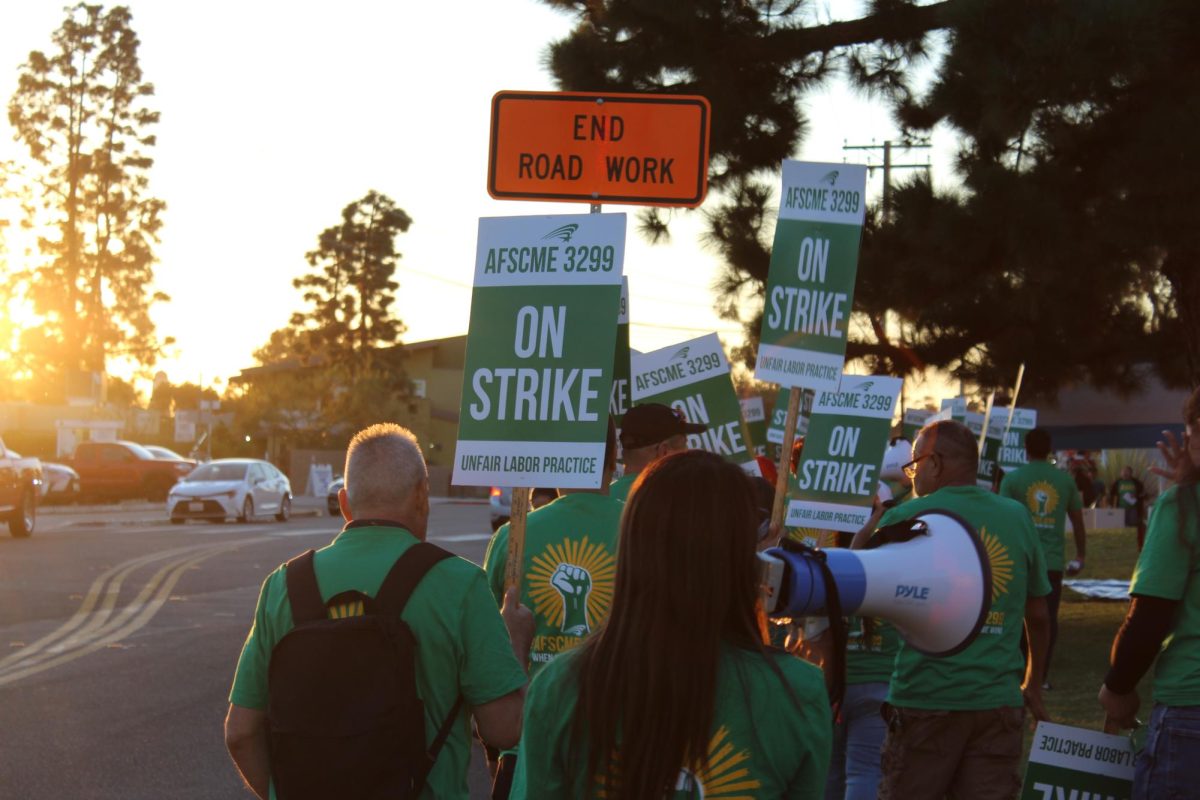More than 10,000 members of the American Federation of State, County, and Municipal Employees Local 3299 union across all major University of California campuses and health centers withheld labor for two days, Nov. 20 and Nov. 21.
The strike began at 6 a.m. and concluded at 6 p.m. on both days. UC San Diego’s AFSCME 3299 members, alongside students and sibling unions who stood in solidarity, participated in marches across three picket line locations: UCSD’s main campus, the La Jolla Medical Center, and the Hillcrest Medical Center.
AFSCME is the third largest union in the nation, representing over 1 million workers in the United States. Its local, AFSCME 3299, is the University of California’s largest employee union representing custodians, medical technicians, and service workers across its institutions. The UC chapter of the AFSCME union represents over 35,000 patient care technical workers, service workers, and skilled craft workers.
The strike comes after AFSCME 3299 filed an unfair labor practice charge against the university on Oct. 10.
“The University announced dramatic – and unlawful – cost increases for employee healthcare benefits. The University intends to increase premiums by 9 to 11%, increase co-pays for outpatient visits and prescription drugs by 50%,” the ULP states. “This unilateral change is only the latest sign of the University’s bad faith bargaining.”
99% of union members registered to vote approved the two-day strike.
In a press release from Nov. 8, AFSCME 3299 alleges that the University of California’s team refused to provide critical staff vacancy and financial information relevant to time-sensitive bargaining sessions and sent unprepared UC representatives who lacked negotiating power to bargaining meetings.
Michael Avant Jr., president of Local 3299 and vice president of AFSCME, criticized the University’s bargaining efforts.
“Instead of being a constructive and transparent partner seeking to bring us closer to agreement, UC has sought to drive us farther apart by withholding critical information, showing up unprepared and without authority to compromise, and by seeking to unilaterally impose health care cost increases that will function as a wage cut on workers already struggling to survive,” he said in a blog post for AFSCME on Nov. 20.
Isaac Zamora, a respiratory care practitioner who is a member of the union’s bargaining team, shared his takeaways from the two-day strike with The UCSD Guardian.
“This is the largest [strike] I’ve ever seen. I’ve been [here for] 16 years. I’ve been in every strike they’ve ever had,” Zamora said. “This is the largest group of people to come out. Workers are very angry with the University. They’re very upset. Students came out. Workers came out.”
Mark Potter, a building maintenance worker at the picket line, explained the rationale that led to the strike vote to pass.
“[The University] doesn’t want to bargain with us. They don’t want to give us a new contract. They basically are just shooting low-ball offers to us,” Potter said. “They can afford to do it; they just don’t want to do it. At one time, we were essential workers during the pandemic, but now, I guess we’re not anymore.”
Some of the striking employees have worked for the University of California for decades and claim that working conditions have deteriorated over time. One such employee is María Arzola, who has worked at UCSD as a custodian for 20 years.
“Tengo muy buena experiencia anteriormente. Ahora ya no porque la universidad no está pagando bien a los trabajadores. Necesitamos respeto,” she said.
“I had a really good experience previously. Now, I do not because the university is not paying its workers well. We need respect,” she said.
Several student organizations expressed solidarity with striking union members. The Movimiento Estudiantil Chicanx por Activismo de UCSD shared an Instagram post on the first day of the strike.
“The issues at stake are not just about pay — they are about ensuring that the hardworking people who make UC campuses and medical centers function every day are valued and supported in a way that reflects their tireless deduction,” the post reads.
In a statement from the UC Office of the President Newsroom on Nov. 21, the University addressed the latest offer it proposed to AFSCME 3299. “UC’s current offer raises the minimum wage for our lowest paid AFSCME employees to $25/hr by 7/1 and at least a 5 percent across the board raise, with many of our lowest paid employees receiving more,” the statement reads.
The statement continues, “We are dedicated to continued conversations regarding these critical issues and ask the union to engage with us meaningfully toward a resolution.”
In response to The Guardian’s request for comment, UC San Diego Health stated that they were prepared for union members at the La Jolla Medical Center and the Hillcrest Medical Center to go on strike.
“UC San Diego Health has detailed plans in place to minimize patient impact and maintain access to hospitals and clinics. All UC San Diego Health facilities will remain open and operational,” their written statement said.
“Delivering outstanding patient care remains our top priority. Patients can rest assured that their clinical care teams, including doctors, nurses and pharmacists will be present to provide care,” the statement concluded.
If their demands are not met by the University at the bargaining table, the union will consider further action, including more strikes.
“If the UC doesn’t move, then we will have to go on strike again. If they don’t bargain, we keep pushing,” said Aidee Mariscal, AFSCME 3299’s internal organizer.
Rio Analco, a UCSD on-campus student organizing intern for AFSCME 3299, spoke with The Guardian on the next steps for the union in ensuring demands are met and contract negotiations resume.
“As of right now, we don’t have any details on any future strikes or anything like that,” he said. “All I can say is that there is a possibility of another strike happening, but as of right now, there aren’t any dates or times specified for anything in the near future.”
Analco elaborated on the implications of their role as a student organizer moving forward.
“From a student perspective, it’s mostly continuing to educate the general student population, making sure that they know that there is information out there, and some of it is essential.”
The Guardian has not received an updated comment from the University of California or AFSCME following the conclusion of the strike as of 5 p.m. on Nov 24.














Austin Carman • Nov 27, 2024 at 11:43 am
Fuck AFCSME! The union gave away a Democrat held seat in CA! The union president should get his head out of his ___!